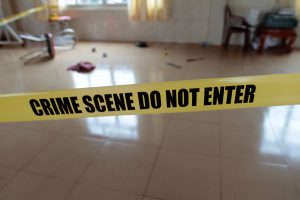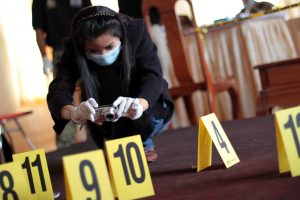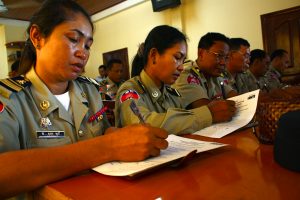Human trafficking has continued to plague Cambodia with increased cases of trafficking of men, women and children occurring in 2016.
And yet after a 15 year focus by donors and UN/NGO groups to stamp out human trafficking in Cambodia, general police officers still receive almost no training and have very few resources to investigate these crimes and apprehend traffickers at local level, and according to a recent speech by Cambodia’s Deputy Prime Minister Sar Kheng, numerous Government and specialised policing units mandated to investigate human trafficking are failing due to increased levels of corruption and involvement in the illegal trade.
Human traffickers are often well-organized rings of criminals who globally make up to $32 Billion usd every year. They have sophisticated international networks that reach out across country borders and they have the ability to infiltrate and source victims at a local level without being suspected or identified. Traffickers are continuing to be very active in Cambodia, where economic disadvantages, a lack of community education, a lack of quality law enforcement and endemic corruption continue to be drivers of increased human trafficking.
 Many young Cambodian women and girls are being trafficked abroad to Malaysia, China and Saudi Arabia to be exploited as domestic maids and in worse cases sold into prostitution. Children are being trafficked for bonded labour in the fishing, garment and building industries, and despite the obvious presence of these types of crime, Cambodia’s law officials struggle in their fight against human trafficking.
Many young Cambodian women and girls are being trafficked abroad to Malaysia, China and Saudi Arabia to be exploited as domestic maids and in worse cases sold into prostitution. Children are being trafficked for bonded labour in the fishing, garment and building industries, and despite the obvious presence of these types of crime, Cambodia’s law officials struggle in their fight against human trafficking.
The state of policing in Cambodia and its ability to detect and reduce human trafficking crimes remains poor. Human trafficking investigations if commenced at all, are basically limited to collecting testimonies from victims and witnesses who have luckily been removed from exploitation and have had the courage to report it to police; or based solely on admissions of lower level offenders who have dumbly been caught. Physical evidence is rarely presented in courts and if evidence is presented, in many cases it is deemed non-admissble due to poor evidence collection methods. Cambodian Police receive minimal training in crime scene management and evidence preservation, making it very easy for traffickers to be detected. Throw in endemic corruption by officials, police and courts and it makes it very easy for traffickers to escape prosecution.
 Raising police standards and increasing their ability to investigate crimes is the only way Cambodia has any hope of eliminating human trafficking and the exploitation of men, women and children. Introducing mandatory training for all Cambodia police officers in subjects such as understanding the basic elements of investigation, evidence collection and preservation, suspect identification, and victim-sensitive interviews, will go a long way to increasing the capacity of police to detect crime.
Raising police standards and increasing their ability to investigate crimes is the only way Cambodia has any hope of eliminating human trafficking and the exploitation of men, women and children. Introducing mandatory training for all Cambodia police officers in subjects such as understanding the basic elements of investigation, evidence collection and preservation, suspect identification, and victim-sensitive interviews, will go a long way to increasing the capacity of police to detect crime.

But its not just about raising the capacity of police to investigate, raising the standards of police in general is paramount to having a police force that meets the expectations of the community. From the beginning of police recruitment, all the way through to Police Command, police need to be educated on the extreme importance of ethics, proper conduct, the responsibility of policing power and in a country where law enforcement is marred with corruption, be held accountable if they are involved in corruption or poor policing behaviour; being dismissed from their employment or prosecuted on every occasion if they commit a crime or are involved in corruption.
 Not raising the standards of policing, both in investigation capacity and in ethical conduct has extremely far reaching consequences. Cambodian National Police will never be able to reduce trafficking crimes, maintain community safety and increase public confidence in the service without high policing standards.
Not raising the standards of policing, both in investigation capacity and in ethical conduct has extremely far reaching consequences. Cambodian National Police will never be able to reduce trafficking crimes, maintain community safety and increase public confidence in the service without high policing standards.
(Note – all images taken from SMCS RISK training programs and operations)